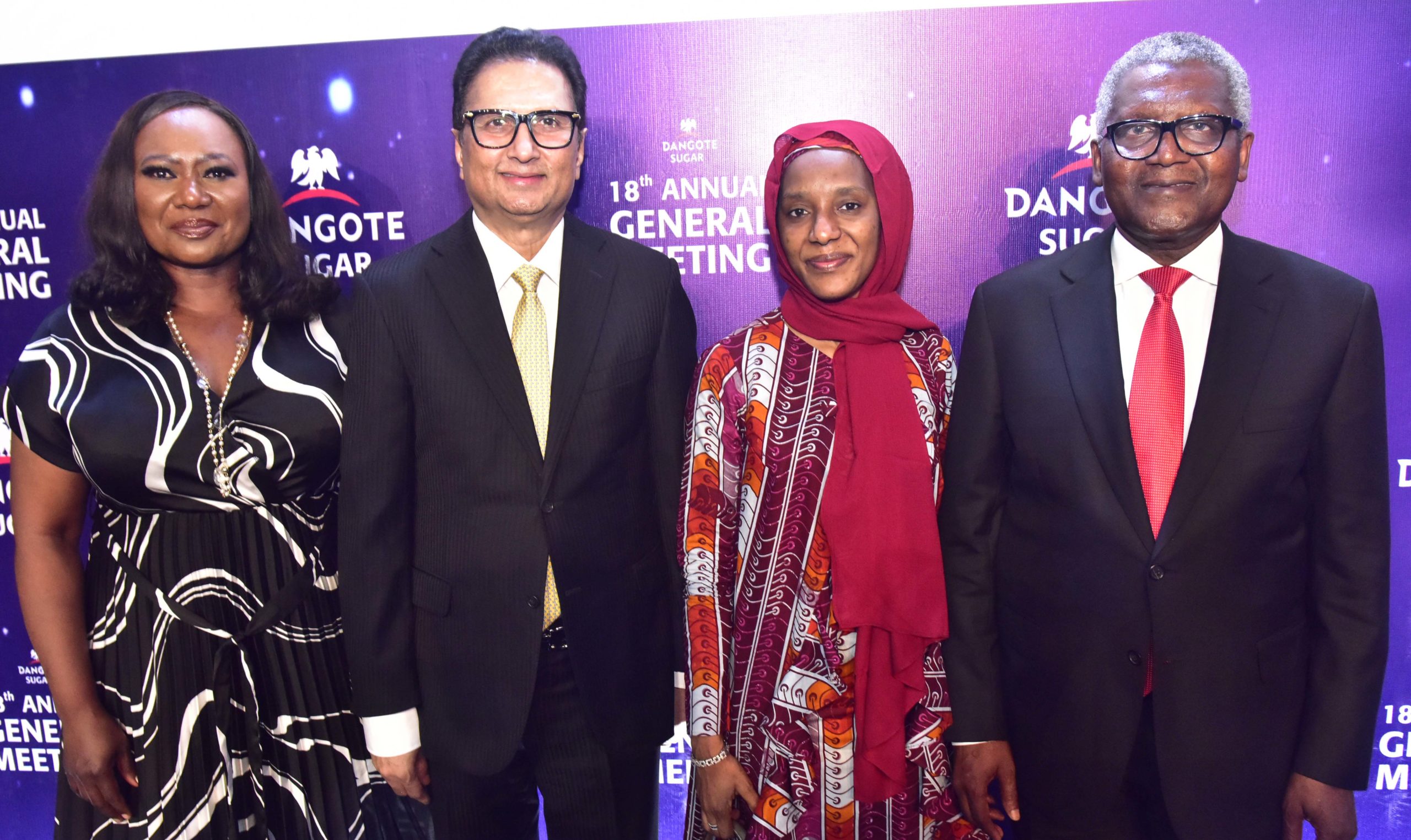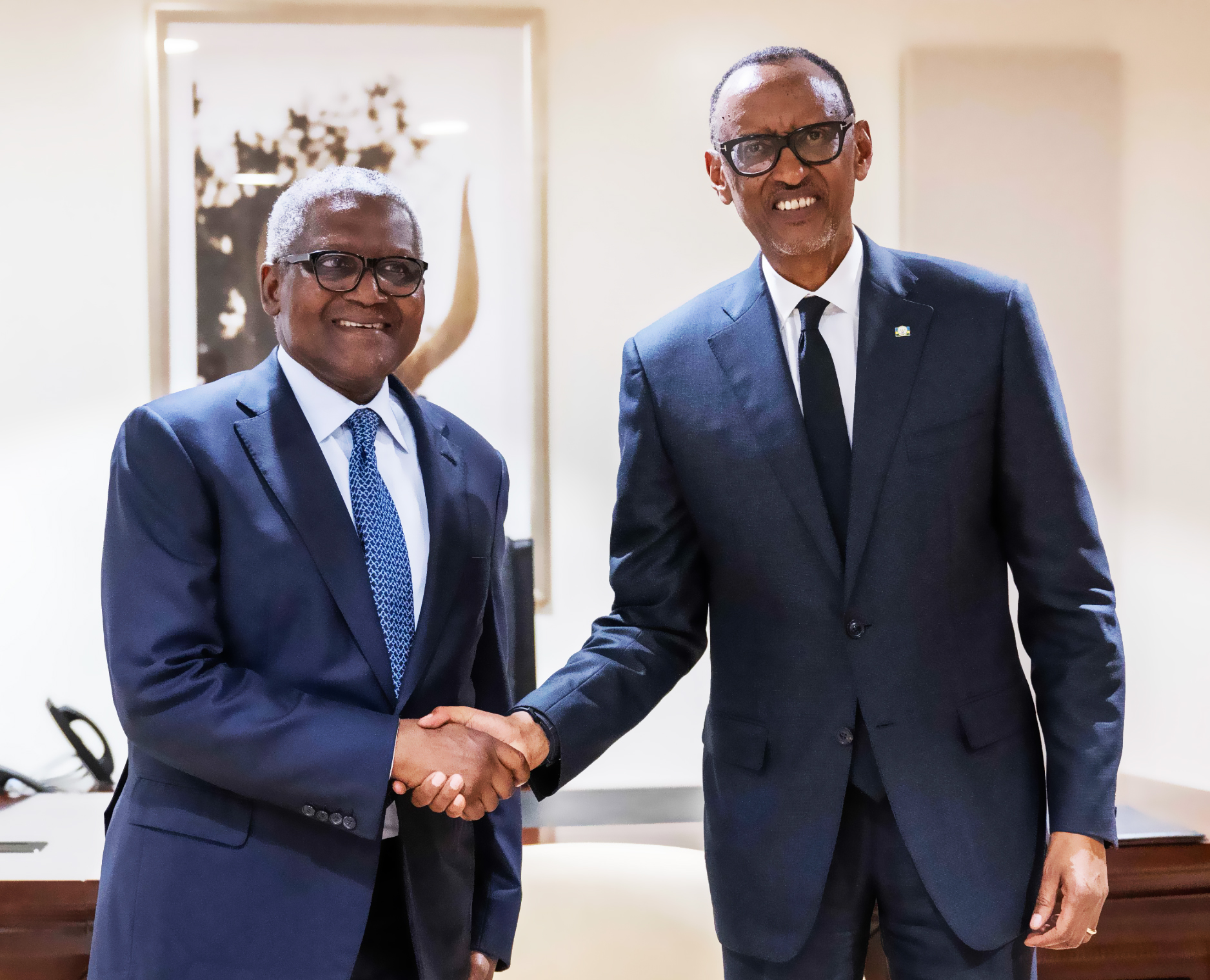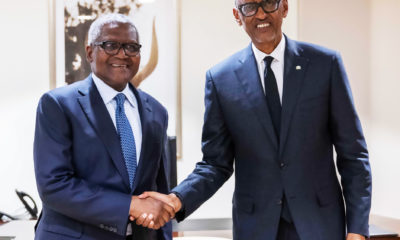Business
Backward Integration: Dangote Targets 700,000MT Of Refined Sugar In Four Years

. . . As Q1 Revenue Rise By 20.1% To N122.7bn
The Dangote Sugar Refinery Plc (DSR) has unveiled plans to produce 700,000 metric tonnes of refined sugar from locally grown sugarcane in the next four years, through its Backward Integration Programme (BIP).
Chairman, DSR, Aliko Dangote made the disclosure at the company’s 18th Annual General Meeting (AGM) on Tuesday, in Lagos.
The AGM coincided with the Nigerian Exchange (NGX) releasing the company’s first-quarter result for 2024, which indicated an increase of 20.1 percent in its revenue to N122.7 billion.
According to Dangote, in alignment with the Federal Government of Nigeria’s policy guidelines, DSR continues to focus on and enhance its Backward Integration Project (BIP) by deploying and reviewing project strategies to ensure efficient delivery.
He noted that the 700,000 metric tonnes would meet 50 percent of the current market demand for refined sugar.
He added that the 10-year sugar development plan to produce 1.5 million MT of sugar per annum from locally grown sugarcane remains a germane roadmap to the attainment of the company’s objectives.
He said, “Our focus is on achieving the revised targets set for DSR Numan Operations, Dangote Adamawa Sugar Limited, and Nasarawa Sugar Company Limited, while we are hopeful that the Taraba State Government will resolve the community payment issues that have led to the stoppage of activities at the Dangote Taraba Sugar Limited, Lau/Tau project.”
Dangote pointed out that “…During the year under review, despite the challenges we were faced with, the company significantly scaled up investment in the Backward Integration Projects with the ongoing expansion of the DSR Numan factory refining capacity from 3,000TCD to 9,800TCD year-end.
“The factory will be increased with an additional 5,200TCD to 15,000 TCD (tonnes of cane crushed per day) eventually to meet the need in view of the massive land development activities also going on at the site. The aim is to achieve 24,200 hectares in total by the year 2029.”
He also emphasised that despite the adverse impact on the business environment by the continuous increase in the inflationary trend, lack of liquidity and FX to fund the company’s equipment import among others for the backward integration projects, concerted efforts are ongoing to secure the needed funds for the development of the Nasarawa Sugar Company Limited project at Tunga in Awe Local Government Area of the state.
“This will enable the company to put in place the needed infrastructure for the eventual commencement of full-scale production and ensure that the Dangote Sugar Backward Integration ‘Sugar for Nigeria Project’ is achieved. In the end, over $700 million investment would be committed to the Backward Integration Programme,” he added.
Dangote said that the Dangote Sugar (Ghana) Limited, was established as a subsidiary of the Company during the year under review, in line with the plan to expand its presence in the sugar industry across Africa.
On outlook, he stated that “achievement of the goals of the Sugar Backward Integration Master Plan remains our focus. This will go a long way in delivering the anticipated benefits, especially in FX savings and cushioning its impact on our operations amongst other benefits to the company, all stakeholders, and the nation.”
Group Managing Director/CEO, Dangote Sugar, Ravindra Singhvi said, “Despite these challenges, we are resolute and focused on the delivery of our business targets in the medium to long term.”
He pointed out that “as we continue to navigate through the scarcity and high cost of foreign exchange, escalating costs of raw materials amongst others, our focus is to enhance the effectiveness of our supply chain processes, optimise cost, improve our operational efficiencies and delivery on our Sugar for Nigeria backward integration project.”
In addition, Singhvi pointed out that, “the target is to produce a minimum of 1.5MT refined sugar annually from locally produced sugarcane at our integrated sugar production estates, which is expected to alleviate some pressure on costs and our demand for foreign currency.
“Achievement of a sustainable business remains one of our key strategies and concerted efforts were made towards sustaining the achievements we have recorded in the past.”
Business
JUST IN: CBN Hikes Interest Rate To 26.25%
The Central Bank of Nigeria’s Monetary Policy Committee has raised the benchmark interest rate to 26.25 percent.
This announcement was made by the CBN Governor, who also chairs the MPC, following the committee’s 295th meeting in Abuja.
In the March meeting, the benchmark rate was previously increased by 200 basis points, from 22.75 percent to 24.75 percent.
The committee has consistently adopted a hawkish policy this year to combat persistent inflation in Nigeria.
As of April, Nigeria’s inflation rate had surged to 33.69 percent.
While several analysts anticipated a rate hike, some suggested that the central bank might consider maintaining the current rate, given the month-on-month moderation in inflation growth.
Details later……………
Business
AFRICA CEO FORUM: Dangote Calls For More Investments To Propel Africa’s Economic Growth

President of the Pan-African Conglomerate, Dangote Industries Limited (DIL), Aliko Dangote has called for increased investments in the African continent to foster its rapid growth and development.
He made the call at the largest gathering of private sector leaders in Africa, the Africa CEO Forum in Kigali, Rwanda.
According to Dangote, recent trends underscore Africa’s pivotal role as the future epicenter of global progress.
The business mogul cautioned against the continent’s overreliance on raw material exports, but advocating instead for strategic investments that will propel indigenous industries. He urged African nations to resist the urge to export raw materials but to nurture domestic manufacturing capabilities so as to reduce dependency on imported consumer goods.
He said, “Looking ahead, Africa holds the key to its greatness. I’m not merely investing money but dedicating my entire being to this cause. In Africa, possibilities are boundless. It is like a scratch card; you won’t know what is inside unless you scratch it.
“For some of us, despite the boom of the capital market in the US, we didn’t really participate, rather we invested in Africa.”
Over the past seven years, Dangote pointed out that he had channelled over $25 billion into bolstering Africa’s self-sufficiency in vital sectors such as fertilizers, petrochemicals, and refined products.
Notably, he said the monumental Dangote Refinery, boasting a capacity of 650,000 barrels per day, stands poised to meet the burgeoning demand across West Africa, Central Africa, and South Africa.
“We have finished our refinery; it is quite big. We believe it is what Africa needs. If you look at the entire continent, there are only two countries that don’t import petroleum products, only Algeria and Libya but the rest import.
“We need to change that, so we don’t just produce raw materials but finished products and create jobs. One of the things we need to know as Africans is that when we produce raw material and export them while others dump finished products on our continent, what we are doing is that we are importing poverty while exporting jobs. We must change the narrative.
“We just commissioned in February. We are producing jet fuel and diesel. By next month, we will be producing gasoline but what that will do is that it will be able to take most of the African crudes that are being produced and be able to supply refined products not only in Nigeria because our capacity is too big for Nigeria.
“It will be able to supply in West Africa, Central Africa and South Africa. This is the first phase, we are going to the next phase by next year,” he said.
Expressing concern over Africa’s paradoxical export of raw materials juxtaposed with an influx of imported finished goods, Dangote underscored the urgent need to reverse this trend.
He lamented that exporting raw materials while importing finished goods perpetuated a vicious cycle of job loss and poverty.
Founded in 2012, the Africa CEO Forum, is a platform through which African decision-makers connect with each other continuously, as well as with international investors and institutions operating on the continent.
It has evolved into an organisation dedicated to facilitating business in Africa through the exchange of ideas and experiences.
Business
ICAN, NGX Regco Recommit To Transparency, Excellence In Corp Reporting

. . . As Dangote Cement, Airtel, Seplat Top Awards
The Institute of Chartered Accountants of Nigeria (ICAN) and the NGX Regulation Limited (NGX RegCo) on Friday, 17th May held the maiden corporate reporting award.
Biztellers reports that the award recognizes the top 30 most capitalized companies listed on the Nigerian Exchange (NGX) for the 2022 financial reporting year.
It was gathered that the awards underscored both organization’s shared commitment to fostering transparency, accountability, and international best practices within the private sector. Evaluation criteria included financial reporting, corporate governance, and sustainability reporting.
Dangote Cement secured the top position across all three categories, earning the Platinum award alongside the best-in-class award of excellence in corporate governance. Airtel clinched the gold award, securing the second position and the best-in-class award of excellence in financial reporting for the period under review.
Seplat Energy was honored with the Silver award while also receiving the best-in-class award for excellence in sustainability reporting.
President, ICAN, Dr. Innocent Okwuosa, commended NGX RegCo for ensuring better disclosures and reporting among listed companies.
He noted that corporate reporting had evolved over the years from the time that most of its content focuses on financial reporting to when there emerged the clamour for incorporation of social and environmental disclosures.
He emphasized the evolution of corporate reporting over time, highlighting the shift from a primary focus on financial reporting to the increasing request to incorporate social and environmental disclosures, noting that “the latter has evolved and have been differently propagated including but not limited to Environmental Social and Governance (ESG) disclosure and of late sustainability disclosures”.
Dr Okwuosa added that good corporate reporting must reflect the best elements in corporate governance, financial, and sustainability reporting, highlighting that the maiden edition is limited to NGX-30 companies for ease of administration and will be extended to all the listed companies in the future.
On his part, CEO, NGX RegCo, Olufemi Shobanjo, highlighted that “without a doubt, transparency is one of the key drivers of any economy. It ensures full disclosure of information by entities and that such information is easily accessible to members of the public to make informed decisions.
“Over the years, there has been an evolution in the type and quality of information demanded, driven by heightened expectations from investors, decision-makers, and society as a whole.”
He added that “while financial reports remain at the forefront of information required by stakeholders, the concept of Environmental, Social and Governance (ESG) considerations has become an area of increasing interest to both public and private sector stakeholders”.
Shobanjo attributed this to the interplay between ESG and key issues such as sustainable development, corporate governance, climate change, stakeholder engagement, and community relations amongst a myriad of other issues.
“Stakeholders are beginning to demand more accountability, and companies are required to think beyond just profitability by expanding their scope to include the ethical impacts that their operations have on society or communities within which they operate,” he added.
He concluded that “as a self-regulatory organization, NGX Regulation remains committed to ensuring that the expectations of investors and other stakeholders regarding access to quality information are met.”











